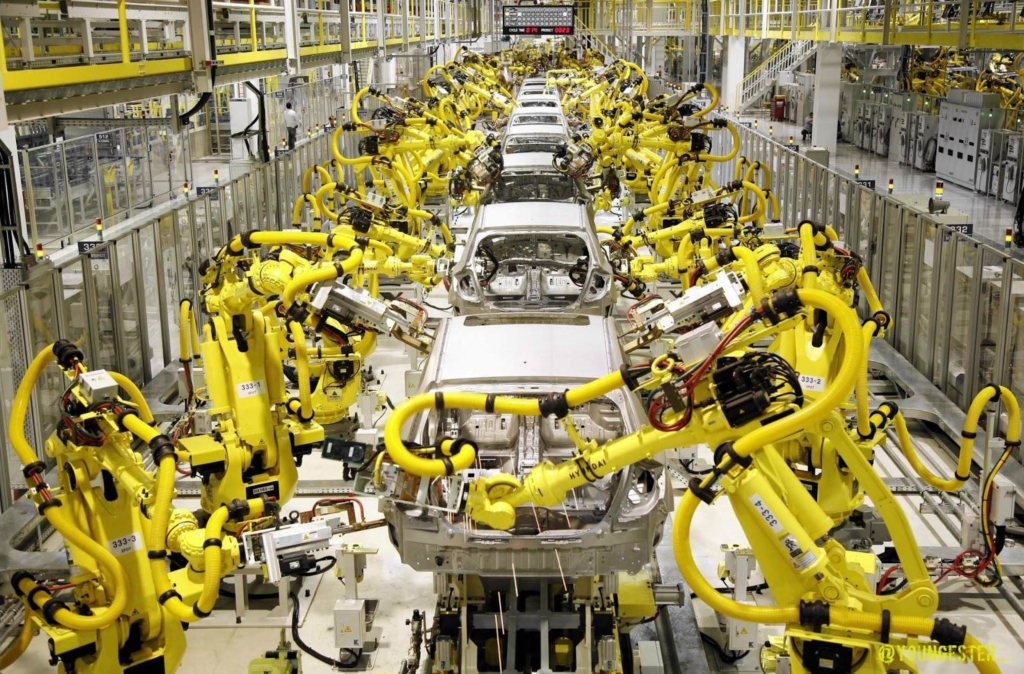Automation & Ownership

What do we do when companies accelerate the pace of automation to guard against supply shocks? What does a post-COVID economy look like when we need to recalibrate the job market to meet the potential increase in automation? The COVID-19 pandemic may act as a catalyst for more automation.
If the agriculture industry suffers severe labour shortages, then it seems unlikely that advanced-economy farmers will return to business as usual. Automating their operations could mitigate the risk of dependence. Yet, a recession brought on by the lockdown might not be saved by the robots. Automation is a pre-crisis crisis. Supply chains have already been through increasing pressure to move towards automaton, and nearly 75 percent of companies report supply chain disruptions in some capacity due to COVID-related transportation restrictions.[1]
Automation-intensive industries which rely on robot-run and human-staffed production lines, haven’t been saved by their move towards automation. Countries like China, Germany, Japan and South Korea, which have the highest density of automated operations, are continually laying off thousands of workers as their economy is hit by COVID-19.[2]
The lesson to learn here is that a fully-automated factory may increase their productivity and reduce the costs of labour, but by eliminating jobs for human workers it could have the opposite effect as humans enable the factory to invest and consume. A phrase often used to describe this is ‘wealth is collectively produced and privately appropriated’.
Automation can replace humans as workers, but it cannot replace them as functioning members of an economy. However, the owner of a factory doesn’t tend to look at their business model from a macroeconomic perspective. Their function in the economy is limited – my factory has seen a decrease in demand because of the lockdown, the best option for me is to increase productivity by introducing automated operations and reducing costs through replacing human workers.
To ensure that the demand for these factories remain in place, so that people in lockdown can continue to spend and keep the wheel of the economy turning, people have suggested implementing a Universal Basic Income (UBI). This is a universally distributed income independent of the citizen’s contribution to the economy. Both the factory worker and factory owner need to service their debts. With a serious disruption in demand and supply, the UBI offers a floor for the economy and provides security for workers and owners. Although a promising proposal, we need to ask if demand is really the primary issue in this picture.
A UBI may offer the short-term fix we require, but it doesn’t offer the wider strategy needed to deal with the question of ownership. In the factory owner analogy, the owner faces a pressure towards automation because they hold a different set of rewards and responsibilities than the workers that they are replacing. This distribution and nature of business ownership is a critical factor in inequality.
If our economy does offer a UBI then through increased automation, the share of income going to the capital owners increases over time. This would be less of a problem if capital was broadly owned. Yet, 45% of the nation’s wealth is owned by the wealthiest 10% of households.[3] A UBI would sustain the economy but it would also sustain rising capital income. The narrow ownership of economic assets is likely to drive rising inequality without redistribution of ownership.
A tax on wealth can certainly redistribute the capital income, but the redistribution of ownership also needs to be considered. The UK comes near the bottom of OECD economies in terms of the extent to which patterns of ownership support economic democracy. By shifting the ownership model you can also change the rewards and responsibilities of the company. This could offer new pressures which are redistributive by design, generative in purpose, democratic in orientation, and have a sense of connection to place.
As the pandemic affords us the opportunity to begin looking at whose interest the economy serves, with continued calls for implementing a UBI, we should also look at ownership and discuss frameworks which can reorientate enterprise towards the common good. We don’t just need tools to fix a broken economy, we need a strategy to change how the economy works.
[1] https://www.instituteforsupplymanagement.org/news/NewsRoomDetail.cfm?ItemNumber=31171&SSO=1#_blank
[2] https://www.cnet.com/roadshow/news/honda-nissan-lay-off-workers-coronavirus-covid-19-economy/#_blank
[3] https://commonweal.scot/policy-library/disruptive-technologies

There is a story told of Henry Ford taking one of the trade union officials up to an office overlooking the assembly line and saying bombastically to him that all these workers would be replaced by robots, to which the trade unionist replied, “And who is going to buy your cars, Henry?”